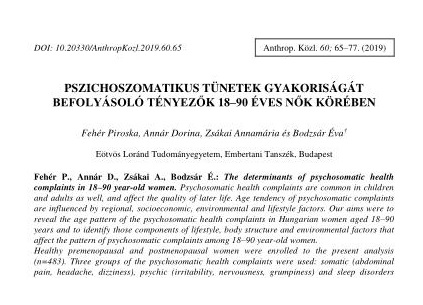Pszichoszomatikus tünetek gyakoriságát befolyásoló tényezők 18–90 éves nők körében
Absztrakt
Psychosomatic health complaints are common in children and adults as well, and affect the quality of later life. Age tendency of psychosomatic complaints are influenced by regional, socioeconomic, environmental and lifestyle factors. Our aims were to reveal the age pattern of the psychosomatic health complaints in Hungarian women aged 18–90 years and to identify those components of lifestyle, body structure and environmental factors that affect the pattern of psychosomatic complaints among 18–90 year-old women.
Healthy premenopausal and postmenopausal women were enrolled to the present analysis (n=483). Three groups of the psychosomatic health complaints were used: somatic (abdominal pain, headache, dizziness), psychic (irritability, nervousness, grumpiness) and sleep disorders (awakenings during the night, falling asleep difficulties, waking up tired). Frequency distributions of women experiencing somatic, psychic complaints and sleep disorders often (daily or several times a week) were analysed by comparing the results derived from our previous auxological study. Logistic regression analysis was applied to reveal the relationship between the groups of psychosomatic health complaints and the hypothesized predictive factors.
The frequency of the most psycho-somatic complaints reached maximum values in the age-group of 21–25 years and another increase was identified in women aged 56–60. Irritability, waking up tired and awakenings during the night were the most frequently reported symptoms. The frequency of symptom of awakenings during the night increased up to the age group of 61–65 years. The results of the regression analysis revealed that the frequency of the psychic complaints and the level of physical activity affected the frequency of somatic complaints. Age, sleep disorders and somatic complaints were determinants of the psychic complaints. Postmenopausal status and the frequency of the psychic complaints influenced the frequency of sleep disorders.
Numerous factors of lifestyle and body structure were tested in the analysis. Special life events (school, work, birth of children, menopause) are suspected in the background of the highlighted periods. More factors (socioeconomic status, nutrition, health condition, disabilities) should be considered in future studies.




